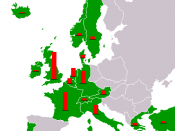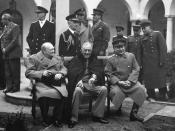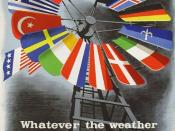The end of the Second World War was a time of great political turmoil and upheaval. The Marshall plan was implemented to fund not America and Britain (the victors) but the countries that had suffered most and did not have enough money to repair the damage. The League of Nations had proved itself redundant due to its inability to maintain peace. Other organisations that could hold the peace had to be established.
In 1945, the Yalta conference decided the future of Europe. It included Winston Churchill, Franklin Roosevelt and Joseph Stalin. It was agreed that United Nations would be started and there were talks about the fate of Poland. It was a sign of things to come when the talks on Poland halted. From this halt the country was unrepresented on the United Nations charter.
Attempts by the American, British and Soviet Foreign Ministers, meeting in Moscow a year later, to draw up peace treaties for Germany and Austria, ended in failure.
To prevent the underhanded communist takeover occurring in Greece and Turkey, America sent a four hundred million dollar aid package to the nations; this concept became known as ?the Truman Doctrine?.
Apart from those countries, Europe was in economic disorder and needed aid vitally. US Secretary George Marshall drew up ?the Marshall Plan? or European Recovery Programme. Most European countries were eager to participate and the assistance from the US really strengthened alliances. The Soviet Union and other communist/socialist countries of the Eastern bloc declined to take part in the plan. This decline was a big step in the distancing of the two powers. The Marshall Plan was wildly successful; after a couple of years industry was stronger than before the war. For the US the communist toppling of Czechoslovakia marred this success.
There was now...


